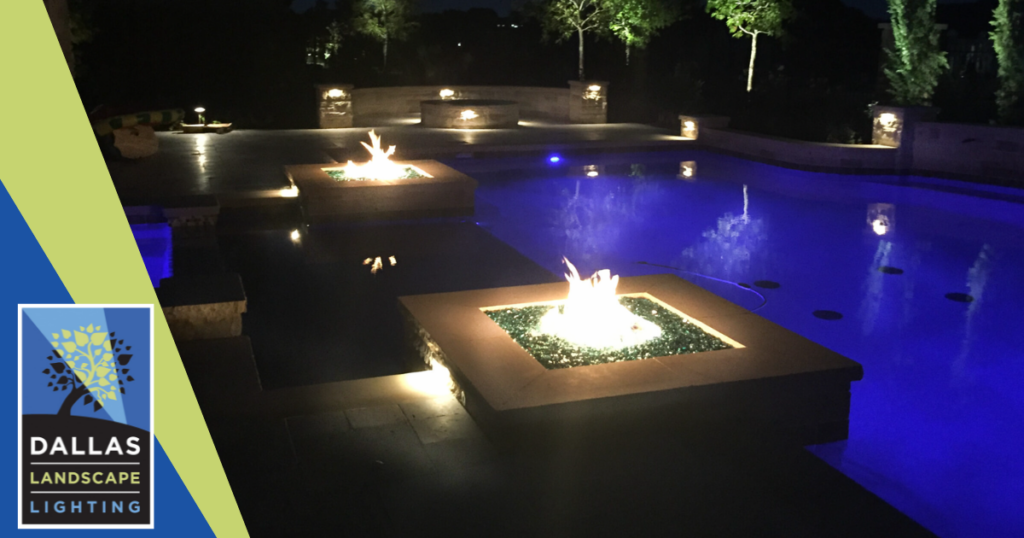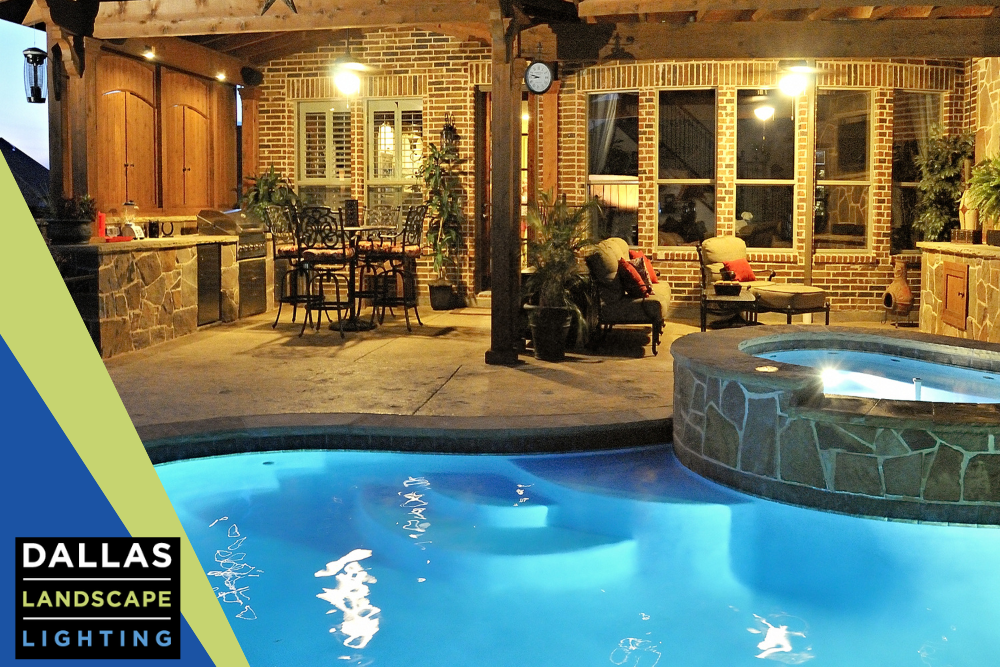Pool Lighting and Pool Computers: Automate Your Outdoor Living Space

If you’re like many people, you’d love to automate your outdoor living space and simplify your enjoyment of your yard, swimming pool and other outdoor amenities — and you know that pool lights can transform your swimming pool’s look entirely. The good news is that Dallas Landscape Lighting is here to help, and we can make your dreams a reality. We specialize in outdoor lighting, pool lighting, electrical services, pool computer installation and so much more.
Pool Lighting, Explained
Pool lighting is an essential part of any swimming pool, whether it’s indoors or outdoors. When your pool has the right illumination, you can swim around the clock, provide additional safety for yourself and your guests, and create a visually stunning effect that makes your pool more inviting.
The primary reasons people choose to install pool lighting include:
- When you have the right lights in your pool, they improve safety and visibility. Swimmers can see clearly underwater, which helps prevent accidents and injuries. Additionally, swimmers and guests walking around the pool can clearly see the pool’s outline when they’re not in the pool — and that means additional safety for others, too.
- Extension of pool hours. If your pool is illuminated, you can swim at night. That extends the hours you can enjoy your outdoor living space and gives you a whole new swimming experience.
- There’s no denying that a beautifully lit pool looks more inviting and creates an unmistakable ambiance in any outdoor living space. In fact, pool lights can transform an ordinary swimming pool into an extraordinary one.
What Types of Pool Lights Are Available?
You can choose from a number of different types of pool lights when you’re illuminating your swimming pool. The most popular options include LED lights, fiber optic lights and incandescent lights. The following sections explore these options.
LED Pool Lighting
LED pool lights are among the most popular types of illumination for swimming pools. These small semiconductor devices emit light when current flows through them, and then use less energy and last longer than other types of pool lights do. Another reason many people choose them is that they’re available in white and a wide range of colors — all with the same bulb — and you can typically control brightness, color changes and light patterns using a remote, a pool automation system (see the later section, “What Are Pool Computers or Pool Automation Systems,” for more information) or a smartphone app.
LED pool lights have a number of other benefits, as well. They’re very energy efficient, they require very little maintenance and they’re easily customizable. They’re safe to use in the water and can provide you with a bright, even light that enhances your pool’s aesthetic appeal.
Request A Free Consultation or Estimate Now!
Fiber Optic Pool Lighting
 Fiber optic pool lighting uses fiber optic cables to transmit light. Usually, the light source is outside the pool. These lights work by transmitting light (from an outside source) through a bundle of small, transparent fibers made of glass or plastic. The fibers are coated with a thin layer of reflective material, which helps contain light inside them.
Fiber optic pool lighting uses fiber optic cables to transmit light. Usually, the light source is outside the pool. These lights work by transmitting light (from an outside source) through a bundle of small, transparent fibers made of glass or plastic. The fibers are coated with a thin layer of reflective material, which helps contain light inside them.
Usually, the light source is a halogen or LED bulb. A special lens directs the light into the fibers to illuminate your swimming pool. Their safe to using the water because the light source is outside, and only the fiber optic cables are submerged. These lights also consume less energy than traditional incandescent bulbs do, and they last for quite some time. They also offer you customizable lighting options, and you can control fiber optic pool lights with a remote or pool automation system. One thing to keep in mind: These lights are generally more expensive than other types of pool lights are, and they require installation of a separate light source.
Incandescent Pool Lighting
For years, people have used incandescent pool lighting to illuminate their swimming spaces. These lights use a filament, just like the incandescent lights in your home do. Because these lights are more basic, and because the bulbs need to be replaced more often than LEDs or fiber optic bulbs do, they’re typically less expensive than their counterparts are. Although incandescent lights are a good choice in some cases, they’re not right for everyone, because they’re less customizable and produce more heat than other types of pool lighting do. They do, however, create a warmer, more traditional pool lighting aesthetic.
What Are Pool Computers or Pool Automation Systems?
Pool computers, which are technically referred to as pool automation systems, are devices that put your swimming pool on autopilot. They can control a wide variety of factors that affect your enjoyment of your swimming pool, and often, you can take charge of schedules and make changes by using a remote, a smartphone app, or a laptop or desktop computer.
Some pool automation systems include sensors that monitor your pool’s conditions and make adjustments accordingly.
What Do Pool Computers Regulate?
Pool computers regulate a huge range of factors, including:
- Water temperature
- Chemical levels
- Pool lights
- Pool covers
Some automation systems control only one or two of these factors, while others control them all. Here’s a closer look at each.
Pool Computers to Control Water Temperature
Pool automation systems can regulate water temperature and keep it the way you want it. Just like your home’s heating and cooling system, pool computers can turn on heaters when the water temperature drops below the level you specify and turn them off when it’s warm enough.
Pool Automation Sensors for Chemical Levels
A good pool automation system can monitor and adjust your pool’s chemical levels, including chlorine, pH and alkalinity. Systems like these can automatically add the right chemicals, in the right formulations, when levels are too low. They can also turn off chemical feeders when the levels are high, ensuring that your pool is always in the right balance.
Pool Light Automation
Automated pool lighting can help you control brightness, color and light schedule. You can use these systems to set the mood and create an inviting ambiance for yourself and your guests.
Pool Computers to Control Covers
With a pool computer that controls your pool’s cover, you don’t have to remember to cover it yourself when it’s not in use. That can help promote safety, keep your pool clean and reduce evaporation, as well as help you save on water and energy costs.
Benefits of Using Pool Computers or Pool Automation Systems
People use pool computers and automation systems for a variety of reasons, but most commonly, the following:
- Pool automation systems are convenient. Pool computers automate many of the tasks that take up pool owners’ time — tasks that can take away your enjoyment of having a pool in the first place. They help reduce the amount of time and effort you need to put in to keep your pool functioning properly.
- Pool computers are precise. Pool automation systems can provide precise control of the pool’s functions, including its water temperature and chemical levels. One of these systems can help you keep everything at optimal levels around the clock.
- Pool automation systems help improve safety. Most pool automation systems can send you alerts for issues or malfunctions your pool is experiencing. You can also monitor and control your pool from a remote location when you have a good pool computer installed.
- Pool computers can help you save money. Because these systems can optimize your pool’s functions and help you reduce waste when it comes to chemicals and heating and cooling, they can help you save cash each month.
Do You Need to Talk to the Pool Lighting and Pool Computer Experts?
If you need lights in your swimming pool, or if you’re ready to set up a pool automation system that makes owning your swimming pool easier, Dallas Landscape Lighting is here to help. Call our office today or schedule a consultation online with one of our in-house experts who can provide you with the advice, guidance and cost estimate you’re looking for.

